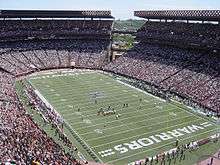Definify.com
Webster 1913 Edition
Stadium
Sta′di-um
Webster 1828 Edition
Stadium
STADIUM
,Definition 2026
Stadium
Stadium
stadium
stadium
English

Noun
stadium (plural stadiums or stadia)
- A venue where sporting events are held.
- 2013 June 18, Simon Romero, "Protests Widen as Brazilians Chide Leaders," New York Times (retrieved 21 June 2013):
- In a convulsion that has caught many in Brazil and beyond by surprise, waves of protesters denounced their leaders for dedicating so many resources to cultivating Brazil’s global image by building stadiums for international events, when basic services like education and health care remain woefully inadequate.
- 2013 June 18, Simon Romero, "Protests Widen as Brazilians Chide Leaders," New York Times (retrieved 21 June 2013):
- An ancient Greek race course, especially, the Olympic course for foot races.
- (now historical) A Greek measure of length, being the chief one used for itinerary distances, also adopted by the Romans for nautical and astronomical measurements, equal to 600 Greek or 625 Roman feet, or 125 Roman paces, or to 606 feet, 9 inches.
- 1621, Robert Burton, The Anatomy of Melancholy, II.ii.3:
- Dionysiodorus […] sent a letter ad superos after he was dead, from the centre of the earth, to signify what distance the same centre was from the superficies of the same, viz. 42,000 stadiums […].
- 1621, Robert Burton, The Anatomy of Melancholy, II.ii.3:
- A kind of telemeter for measuring the distance of an object of known dimensions, by observing the angle it subtends.
- In surveying, a graduated rod used to measure the distance of the place where it stands from an instrument having a telescope, by observing the number of the graduations of the rod that are seen between certain parallel wires (stadia wires) in the field of view of the telescope.
- (biology) A life stage of an organism.
Usage notes
- The alternative plural stadia is occasionally used, chiefly in high-register contexts.
Synonyms
- (venue where sporting events are held): arena
- (Greek unit of length): Olympic stadium
- (graduated rod in surveying): stadia, stadia rod
Derived terms
- stadia rod
- stadia wire
Translations
|
|
|
References
- stadium in Webster’s Revised Unabridged Dictionary, G. & C. Merriam, 1913
Dutch
Pronunciation
- Hyphenation: sta‧di‧um
Etymology
From Latin stadium (“a measure of length, a race course”) (commonly one-eighth of a Roman mile; translated in early English Bibles by furlong), from Ancient Greek στάδιον (stádion, “a measure of length, a running track”), especially the track at Olympia, which was one stadium in length. The Greek word may literally mean "fixed standard of length" (from στάδιος (stádios, “firm, fixed”), from Proto-Indo-European *steh₂-, whence also stand).
Noun
stadium n (plural stadiums or stadia, diminutive stadiumpje n)
Usage notes
- Stadium is a learned term used in certain proper nouns such as Yankee Stadium. The standard Dutch term is stadion.
Related terms
Latin
Etymology
From the Ancient Greek στάδιον (stádion).
Pronunciation
- (Classical) IPA(key): /ˈsta.di.um/, [ˈsta.di.ũ]
Noun
stadium n (genitive stadiī); second declension
- stade (distance of 125 paces)
- racecourse (athletics)
Inflection
Second declension.
| Case | Singular | Plural |
|---|---|---|
| nominative | stadium | stadia |
| genitive | stadiī | stadiōrum |
| dative | stadiō | stadiīs |
| accusative | stadium | stadia |
| ablative | stadiō | stadiīs |
| vocative | stadium | stadia |
Synonyms
- (measure of distance): stadiī (plurale tantum)
Derived terms
- stadiālis
- stadiātus
Related terms
- stadiodromos
References
- stadium in Charlton T. Lewis and Charles Short (1879) A Latin Dictionary, Oxford: Clarendon Press
- stadium in Charlton T. Lewis (1891) An Elementary Latin Dictionary, New York: Harper & Brothers
- STADIUM in Charles du Fresne du Cange’s Glossarium Mediæ et Infimæ Latinitatis (augmented edition, 1883–1887)
- Meissner, Carl; Auden, Henry William (1894) Latin Phrase-Book, London: Macmillan and Co.
- to run a foot-race: stadium currere (Off. 3. 10. 42)
- to run a foot-race: stadium currere (Off. 3. 10. 42)
- stadium in The Perseus Project (1999) Perseus Encyclopedia
- stadium in Harry Thurston Peck, editor (1898) Harper's Dictionary of Classical Antiquities, New York: Harper & Brothers
- stadium in William Smith et al., editor (1890) A Dictionary of Greek and Roman Antiquities, London: William Wayte. G. E. Marindin
Malay
Etymology
From English stadium, from Latin stadium, from Ancient Greek στάδιον (stádion), from στάδιος (stádios), from Proto-Indo-European *steh₂-.
Pronunciation
- (Johor-Selangor) IPA(key): /stadiom/
- (Riau-Lingga) IPA(key): /stadiʊm/
- Rhymes: -iom, -jom, -om
Noun
stadium
- stadium (venue where sporting events are held)
Norwegian Bokmål
Etymology
From Ancient Greek "stadion", via Latin stadium
Noun
stadium n (definite singular stadiet, indefinite plural stadier, definite plural stadia or stadiene)
- a stage (of a process or development)
See also
References
- “stadium” in The Bokmål Dictionary.
Norwegian Nynorsk
Etymology
From Ancient Greek "stadion", via Latin stadium
Noun
stadium n (definite singular stadiet, indefinite plural stadium, definite plural stadia)
- a stage (of a process or development)
See also
References
- “stadium” in The Nynorsk Dictionary.